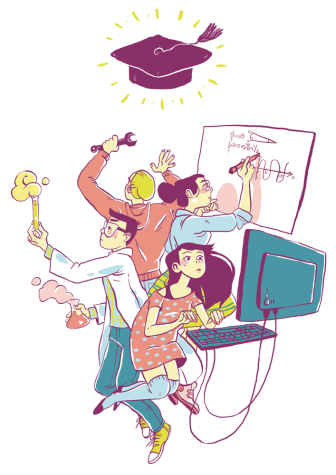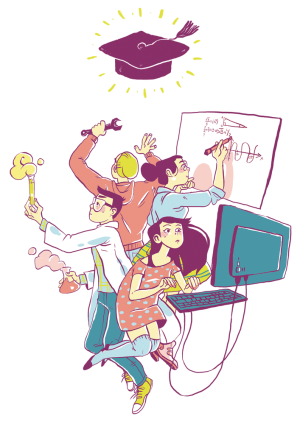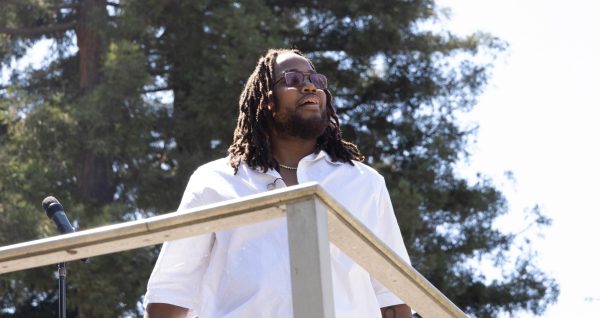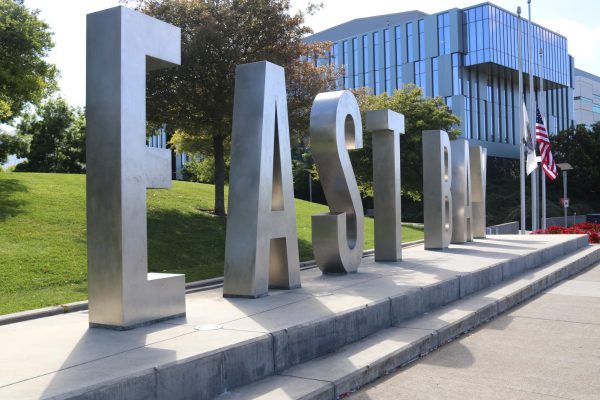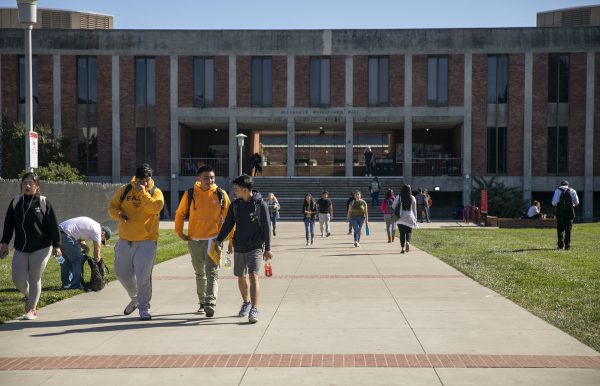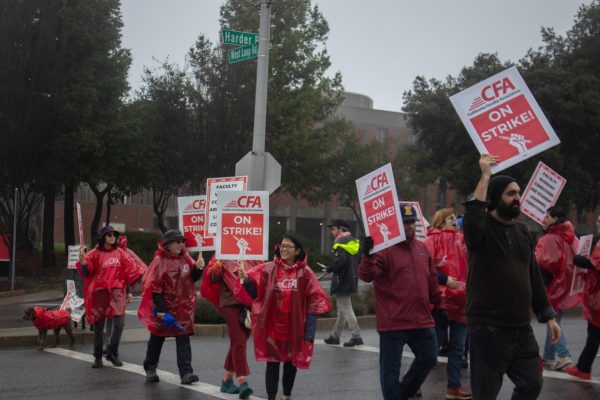The Diversity Inclusion Student Center considered a safe enough space

2015 redesigned Pioneer logo.
November 30, 2017
Stylishly imprinted on the amber-colored wall past the entrance counter, the word “Diversity” is inescapable inside the room. It is followed by a quote from Margaret Mead: “Never doubt that a small group of thoughtful, committed, citizens can change the world.” More than a dozen students and supporting faculty members, all women of African-American descent from the Kaleidoscope Mentoring Program, step inside the Diversity Inclusion Student Center (DISC).
They began to form a circle around a small table. One by one, each person introduced themselves. After the ice breaker, suggestions were offered on what topic the group wanted to discuss. Stress became the initial topic, however it eventually morphed into discussions on student-teacher relationships.
DISC is a safe space provided on campus at Cal State University, East Bay. Its mission aims for “creating and [maintaining] inclusive campus environment that challenges oppression, provides space for dialogue and engagement” for all students. DISC emphasizes that it is a safe space for all students.
Jessika Murphy, the coordinator and lead professional staff member who runs the center, stated in an interview that DISC is a place where students can come and find a community without harassment over their identity. As a student, having graduated from Keene State College in New Hampshire in 2003, Murphy didn’t have any resources that a safe space or diversity center would offer. A place where students wouldn’t have to fear persecution over their race, sexual orientation and gender.
“The DISC is somewhere I know I can go and feel comfortable,” said Noor Kayed, a regular visitor at the DISC center. “I feel safe, I feel like my thoughts and experiences are validated. This helps my emotional well being.”
As a transfer student who moved here from the Central Valley in California, CSUEB would be the fifth college that Liam Hawkyard attended. However, it came to be the school where he would remain, thanks to a safe space offered on campus. When he first transferred, Hawkyard, now a CSUEB alumni who identifies as transgender and queer, was looking for a space that was queer inclusive.
“It’s a really great place for people to make connections, feeling like they belong on campus,” said Hawkyard, an administrative support coordinator at the DISC. “If students feel like their needs are not met on campus, this is a great place to come.”
Hawkyard frequently experienced being shunned as the doors of inclusion were shut in his face. He was mocked by his peers for being openly queer.
Eventually, he discovered that DISC offered LGBTQ+ related events, among many others dedicated to different marginalized groups. “That’s the place for me,” he remembered.
The Diversity Center was created in 2007. Initially, it was run by Associated Student’s Inc. (ASI), our student governing body. In 2014, the center was taken over by the University Union, which made drastic changes, Hawkyard explained.
One of the changes included a modified name. Murphy, who was responsible for the name change, added that “Diversity Center” was not inclusive enough, therefore added “inclusion” to its title. This would ensure that its name would be more inclusive beyond the threshold of race or gender and would include more people such as those with accessibility needs.
Despite its changes, DISC, which is still referred to many as the Diversity Center, claims that it retains the same idea: creating a safe and inclusive space.
“The reporting line didn’t change much, what changed was the work,” Murphy said. She went on to explain that it has more presence under its current administration and has expanded its programs.
The Diversity Center, funded by student fees, offers workshops, speaker series, film screenings and students can even propose their own events.
The DISC finds itself having people come all the time with their own idea for events and is open to hosting any event, so long as it aligns with the center’s mission statement and doesn’t have an excessive capacity of attendees, as there is a limitation with staffing.
One of the more well-known programs at DISC are “Real Talks.” These are discussion programs which, according to Hawkyard, are student-led discourses that discuss topics that are difficult dialogs like “privilege, racism, toxic masculinity or rape culture” that can make some people uncomfortable.
“I like to call this place a ‘safe enough space’ where we’re having those difficult discussions about issues looking at all sides, not just focusing on one side,” Hawkyard stated, insisting that Real Talks can and will challenge beliefs.
Each month, from October to May, the center also hosts events based on themed months. Those themes include Accessibility Awareness, Indigenous History Month, LGBT Pride, Black History Month, Women’s History Month, Latin/Hispanic Month and Asian/Pacific Islander Heritage Month, according to their respective month.
“All of our events are centered on the idea of diversity, inclusion, multiculturalism and social justice. Those are our guiding principles that all of our program is framed around,” Hawkyard added.
Located in the New University Union in room 1005, The Diversity Center is open from 9 a.m. to 5 p.m., Monday through Friday.
While safe spaces like The Diversity Center were offered for a decade now, the idea itself is nothing new. The concept of safe spaces has received numerous news reports over the last few years and has dealt with much scrutiny by critics.
One critic, Judith Shulevitz, in an article for The New York Times titled “In College and Hiding From Scary Ideas” published in March 2015, said that safe spaces “self-infantilize” students, giving them “coloring books, bubbles, Play-Doh.” In turn, this would not prepare them for the real world, she indicated.
In an op-ed for The Los Angeles Times in January, Frank Furedi, sociologist and social commentator, commented that safe spaces create echo chambers, spaces filled with only like-minded people, where opposing opinions are hostilely unwanted. Murphy and Hawkyard disagree with these comments, believing them to be short-sighted perceptions.
“A lot of people who believe that have often never gone to those spaces before and assume ‘Oh, that’s not for me.’ If you don’t go to those spaces, of course your viewpoints aren’t going to be represented there,” Hawkyard stated.
While people who think similarly tend to congregate together, Murphy stressed that it’s important to hear other perspectives, regardless of one’s political leaning.
“We’re not about presenting issues one way, we want to look at all aspects and have a discussion about it where everyone can feel they can participate in that discussion, regardless of their political affiliation or experience,” Hawkyard added.





